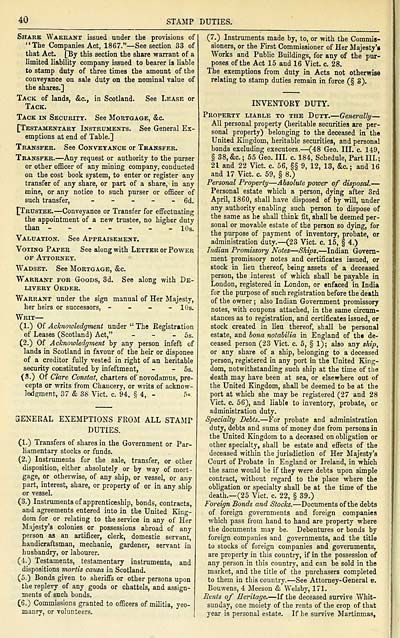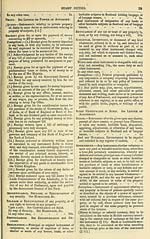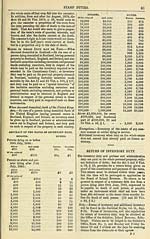Download files
Complete book:
Individual page:
Thumbnail gallery: Grid view | List view

40
STAMP DUTIES.
Share Warrant issued under the provisions of
"The Companies Act, 1867." — See section 33 of
that Act. [By this section the share warrant of a
limited liability company issued to bearer is liable
to stamp duty of three times the amount of the
conveyance on sale duty on the nominal value of
the shares.]
Tack of lands, &c, in Scotland. See Lease or
Tack.
Tack in Security. See Mortgage, &c.
[Testamentary Instruments. See General Ex-
emptions at end of Table.]
Transfer. See Conveyance or Transfer.
Transfer. — Any request or authority to the purser
or other officer of any mining company, conducted
on the cost book system, to enter or register any
transfer of any share, or part of a share, in any
mine, or any notice to such purser or officer of
such transfer, - - - - - 6d.
[Trustee. — Conveyance or Transfer for effectuating
the appointment of a new trustee, no higher duty
than -----__ io s .
Valuation. See Appraisement.
Voting Paper See along with Letter or Power
of Attorney.
Wadset. See Mortgage, &c.
Warrant for Goods, 3d. See along with De-
livery Order.
Warrant under the sign manual of Her Majesty,
her heirs or successors, - - - - 10s.
Writ —
(1.) Of Acknowledgment under " The Registration
of Leases (Scotland) Act," - - - 5s.
(2.) Of Acknowledgment by any person infeft of
lands in Scotland in favour of the heir or disponee
of a creditor fully vested in right of an heritable
security constituted by infeftment, - - 5s.
(3.) Of Clare Constat, charters of novodamus, pre-
cepts or writs from Chancery, or writs of acknow-
ledgment, 37 & 38 Vict. c. 94. § 4, - 5«
SENERAL EXEMPTIONS FROM ALL STAMr
DUTIES.
(1.) Transfers of shares in the Government or Par-
liamentary stocks or funds.
(2.) Instruments for the sale, transfer, or other
disposition, either absolutely or by way of mort-
gage, or otherwise, of any ship, or vessel, or any
part, interest, share, or property of or in any ship
or vessel.
(3.) Instruments of apprenticeship, bonds, contracts,
and agreements entered into in the United King-
dom for or relating to the service in any of Her
Majesty's colonies or possessions abroad of any
person as an artificer, clerk, domestic servant,
handicraftsman, mechanic, gardener, servant in
husbandry, or labourer.
(4.) Testaments, testamentary instruments, and
dispositions mortis causa in Scotland.
(5.) Bonds given to sheriffs or other persons upon
the replevy of any goods or chattels, and assign-
ments of such bonds.
(6.) Commissions granted to officers of militia, yeo-
manry, or volunteers.
(7.) Instruments made by, to, or with the Commis-
sioners, or the First Commissioner of Her Majesty's
Works and Public Buildings, for any of the pur-
poses of the Act 15 and 16 Vict. c. 28.
The exemptions from duty in Acts not otherwise
relating to stamp duties remain in force (§ 3).
INVENTORY DUTY.
Property liable to the Duty. — Generally —
All personal property (heritable securities are per-
sonal property) belonging to the deceased in the
United Kingdom, heritable securities, and personal
bonds excluding executors. — (48 Geo. III. c. 149,
§ 38, &c. ; 55 Geo. III. c. 184, Schedule, Part III.;
21 and 22 Vict. c. 56, §§ 9, 12, 13, &c. ; and 16
and 17 Vict. c. 59, § 8.)
Personal Property — Absolute power of disposal. —
Personal estate which a person, dying after 3rd
April, 1860, shall have disposed of by will, under
any authority enabling such person to dispose of
the same as he shall think fit, shall be deemed per-
sonal or movable estate of the person so dying, for
the purpose of payment of inventory, probate, or
administration duty. — (23 Vict. c. 15, § 4.)
Indian Promissory Notes — Ships. — Indian Govern-
ment promissory notes and certificates issued, or
stock in lieu thereof, being assets of a deceased
person, the interest of which shall be payable in
London, registered in London, or enfaced in India
for the purpose of such registration before the death
of the owner ; also Indian Government promissory
notes, with coupons attached, in the same circum-
stances as to registration, and certificates issued, or
stock created in lieu thereof, shall be personal
estate, and bona notabilia in England of the de-
ceased person (23 Vict. c. 5, § 1); also any ship,
or any share of a ship, belonging to a deceased
person, registered in any port in the United King-
dom, notwithstanding such ship at the time of the
death may have been at sea, or elsewhere out of
the United Kingdom, shall be deemed to be at the
port at which she may be registered (27 and 28
Vict. c. 56), and liable to inventory, probate, or
administration duty.
Specialty Debts. — For probate and administration
duty, debts and sums of money due from persons in
the United Kingdom to a deceased on obligation or
other specialty, shall be estate and effects of the
deceased within the jurisdiction of Her Majesty's
Court of Probate in England or Ireland, in which
the same would be if they were debts upon simple
contract, without regard to the place where the
obligation or specialty shall be at the time of the
death.— (25 Vict. c. 22, § 39.)
Foreign Bonds and Stocks. — Documents of the debts
of foreign governments and foreign companies
which pass from hand to hand are property where
the documents may be. Debentures or bonds by
foreign companies and governments, and the title
to stocks of foreign companies and governments,
are property in this country, if in the possession of
any person in this country, and can be sold in the
market, and the title of the purchasers completed
to them in this country. — See Attorney-General v.
Bouwens, 4 Meeson & Welsby, 171.
Rents of Heritage. — If the deceased survive Whit-
sunday, one moiety of the rents of the crop of that
year is personal estate. If he survive Martinmas,
STAMP DUTIES.
Share Warrant issued under the provisions of
"The Companies Act, 1867." — See section 33 of
that Act. [By this section the share warrant of a
limited liability company issued to bearer is liable
to stamp duty of three times the amount of the
conveyance on sale duty on the nominal value of
the shares.]
Tack of lands, &c, in Scotland. See Lease or
Tack.
Tack in Security. See Mortgage, &c.
[Testamentary Instruments. See General Ex-
emptions at end of Table.]
Transfer. See Conveyance or Transfer.
Transfer. — Any request or authority to the purser
or other officer of any mining company, conducted
on the cost book system, to enter or register any
transfer of any share, or part of a share, in any
mine, or any notice to such purser or officer of
such transfer, - - - - - 6d.
[Trustee. — Conveyance or Transfer for effectuating
the appointment of a new trustee, no higher duty
than -----__ io s .
Valuation. See Appraisement.
Voting Paper See along with Letter or Power
of Attorney.
Wadset. See Mortgage, &c.
Warrant for Goods, 3d. See along with De-
livery Order.
Warrant under the sign manual of Her Majesty,
her heirs or successors, - - - - 10s.
Writ —
(1.) Of Acknowledgment under " The Registration
of Leases (Scotland) Act," - - - 5s.
(2.) Of Acknowledgment by any person infeft of
lands in Scotland in favour of the heir or disponee
of a creditor fully vested in right of an heritable
security constituted by infeftment, - - 5s.
(3.) Of Clare Constat, charters of novodamus, pre-
cepts or writs from Chancery, or writs of acknow-
ledgment, 37 & 38 Vict. c. 94. § 4, - 5«
SENERAL EXEMPTIONS FROM ALL STAMr
DUTIES.
(1.) Transfers of shares in the Government or Par-
liamentary stocks or funds.
(2.) Instruments for the sale, transfer, or other
disposition, either absolutely or by way of mort-
gage, or otherwise, of any ship, or vessel, or any
part, interest, share, or property of or in any ship
or vessel.
(3.) Instruments of apprenticeship, bonds, contracts,
and agreements entered into in the United King-
dom for or relating to the service in any of Her
Majesty's colonies or possessions abroad of any
person as an artificer, clerk, domestic servant,
handicraftsman, mechanic, gardener, servant in
husbandry, or labourer.
(4.) Testaments, testamentary instruments, and
dispositions mortis causa in Scotland.
(5.) Bonds given to sheriffs or other persons upon
the replevy of any goods or chattels, and assign-
ments of such bonds.
(6.) Commissions granted to officers of militia, yeo-
manry, or volunteers.
(7.) Instruments made by, to, or with the Commis-
sioners, or the First Commissioner of Her Majesty's
Works and Public Buildings, for any of the pur-
poses of the Act 15 and 16 Vict. c. 28.
The exemptions from duty in Acts not otherwise
relating to stamp duties remain in force (§ 3).
INVENTORY DUTY.
Property liable to the Duty. — Generally —
All personal property (heritable securities are per-
sonal property) belonging to the deceased in the
United Kingdom, heritable securities, and personal
bonds excluding executors. — (48 Geo. III. c. 149,
§ 38, &c. ; 55 Geo. III. c. 184, Schedule, Part III.;
21 and 22 Vict. c. 56, §§ 9, 12, 13, &c. ; and 16
and 17 Vict. c. 59, § 8.)
Personal Property — Absolute power of disposal. —
Personal estate which a person, dying after 3rd
April, 1860, shall have disposed of by will, under
any authority enabling such person to dispose of
the same as he shall think fit, shall be deemed per-
sonal or movable estate of the person so dying, for
the purpose of payment of inventory, probate, or
administration duty. — (23 Vict. c. 15, § 4.)
Indian Promissory Notes — Ships. — Indian Govern-
ment promissory notes and certificates issued, or
stock in lieu thereof, being assets of a deceased
person, the interest of which shall be payable in
London, registered in London, or enfaced in India
for the purpose of such registration before the death
of the owner ; also Indian Government promissory
notes, with coupons attached, in the same circum-
stances as to registration, and certificates issued, or
stock created in lieu thereof, shall be personal
estate, and bona notabilia in England of the de-
ceased person (23 Vict. c. 5, § 1); also any ship,
or any share of a ship, belonging to a deceased
person, registered in any port in the United King-
dom, notwithstanding such ship at the time of the
death may have been at sea, or elsewhere out of
the United Kingdom, shall be deemed to be at the
port at which she may be registered (27 and 28
Vict. c. 56), and liable to inventory, probate, or
administration duty.
Specialty Debts. — For probate and administration
duty, debts and sums of money due from persons in
the United Kingdom to a deceased on obligation or
other specialty, shall be estate and effects of the
deceased within the jurisdiction of Her Majesty's
Court of Probate in England or Ireland, in which
the same would be if they were debts upon simple
contract, without regard to the place where the
obligation or specialty shall be at the time of the
death.— (25 Vict. c. 22, § 39.)
Foreign Bonds and Stocks. — Documents of the debts
of foreign governments and foreign companies
which pass from hand to hand are property where
the documents may be. Debentures or bonds by
foreign companies and governments, and the title
to stocks of foreign companies and governments,
are property in this country, if in the possession of
any person in this country, and can be sold in the
market, and the title of the purchasers completed
to them in this country. — See Attorney-General v.
Bouwens, 4 Meeson & Welsby, 171.
Rents of Heritage. — If the deceased survive Whit-
sunday, one moiety of the rents of the crop of that
year is personal estate. If he survive Martinmas,
Set display mode to: Large image | Transcription
Images and transcriptions on this page, including medium image downloads, may be used under the Creative Commons Attribution 4.0 International Licence unless otherwise stated. ![]()
| Scottish Post Office Directories > Towns > Glasgow > Post-Office annual Glasgow directory > 1879-1880 > (52) |
|---|
| Permanent URL | https://digital.nls.uk/84460133 |
|---|
| Description | Directories of individual Scottish towns and their suburbs. |
|---|
| Description | Around 700 Scottish directories published annually by the Post Office or private publishers between 1773 and 1911. Most of Scotland covered, with a focus on Edinburgh, Glasgow, Dundee and Aberdeen. Most volumes include a general directory (A-Z by surname), street directory (A-Z by street) and trade directory (A-Z by trade). |
|---|


